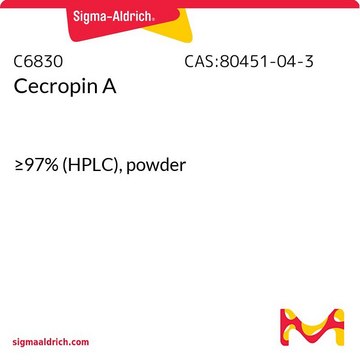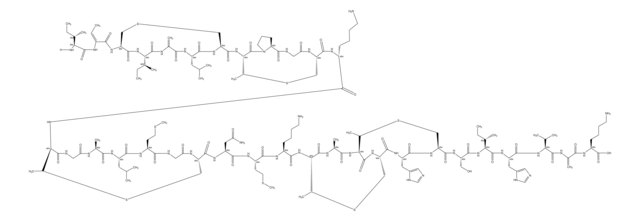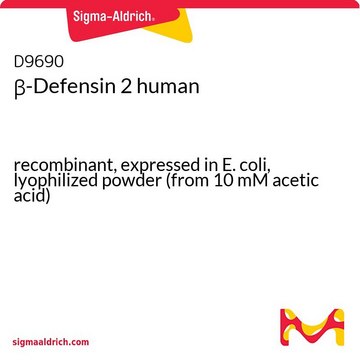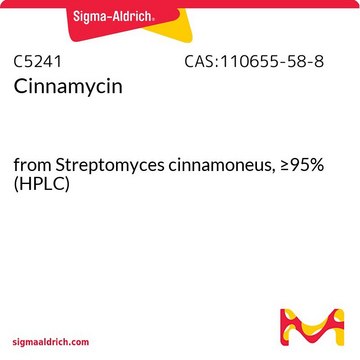About This Item
Recommended Products
Quality Level
Assay
≥97% (HPLC)
form
powder
antibiotic activity spectrum
fungi
Mode of action
cell membrane | interferes
storage temp.
−20°C
SMILES string
S(CC[C@H](NC(=O)[C@@H](NC(=O)[C@@H](NC(=O)[C@@H](NC(=O)[C@@H](NC(=O)[C@@H](NC(=O)[C@@H](NC(=O)[C@@H](NC(=O)[C@@H](NC(=O)[C@@H](NC(=O)[C@@H](N)CCCCN)Cc3c4c([nH]c3)cccc4)CCCCN)C(C)C)Cc2ccccc2)CCCCN)CCCCN)[C@H](CC)C)CCC(=O)O)CCCCN)C(=O)NCC(=O)N[C@@H](CCCN\C(
InChI
1S/C176H302N52O41S/c1-25-97(15)140(174(269)224-139(96(13)14)168(263)212-113(57-36-43-72-179)155(250)199-101(19)145(240)198-91-134(234)228-79-50-64-128(228)167(262)202-104(22)149(244)225-141(98(16)26-2)171(266)203-105(23)148(243)222-137(94(9)10)169(264)219-123(82-93(7)8)152(247)196-89-132(232)205-119(65-67-135(235)236)156(251)201-102(20)146(241)206-112(56-35-42-71-178)154(249)200-103(21)147(242)215-122(144(187)239)81-92(5)6)221-133(233)90-197-153(248)126(85-129(185)229)217-160(255)118(63-49-78-193-176(190)191)213-172(267)143(100(18)28-4)227-166(261)127(86-130(186)230)218-157(252)111(62-48-77-192-175(188)189)204-131(231)88-195-151(246)121(69-80-270-24)211-159(254)114(58-37-44-73-180)207-161(256)120(66-68-136(237)238)214-173(268)142(99(17)27-3)226-163(258)117(61-40-47-76-183)208-158(253)115(59-38-45-74-181)209-164(259)124(83-106-51-30-29-31-52-106)220-170(265)138(95(11)12)223-162(257)116(60-39-46-75-182)210-165(260)125(216-150(245)109(184)54-34-41-70-177)84-107-87-194-110-55-33-32-53-108(107)110/h29-33,51-53,55,87,92-105,109,111-128,137-143,194H,25-28,34-50,54,56-86,88-91,177-184H2,1-24H3,(H2,185,229)(H2,186,230)(H2,187,239)(H,195,246)(H,196,247)(H,197,248)(H,198,240)(H,199,250)(H,200,249)(H,201,251)(H,202,262)(H,203,266)(H,204,231)(H,205,232)(H,206,241)(H,207,256)(H,208,253)(H,209,259)(H,210,260)(H,211,254)(H,212,263)(H,213,267)(H,214,268)(H,215,242)(H,216,245)(H,217,255)(H,218,252)(H,219,264)(H,220,265)(H,221,233)(H,222,243)(H,223,257)(H,224,269)(H,225,244)(H,226,258)(H,227,261)(H,235,236)(H,237,238)(H4,188,189,192)(H4,190,191,193)/t97-,98-,99-,100-,101-,102-,103-,104-,105-,109-,111-,112-,113-,114-,115-,116-,117-,118-,119-,120-,121-,122-,123-,124-,125-,126-,127-,128-,137-,138-,139-,140-,141-,142-,143-/m0/s1
InChI key
YIQHNFUJWYYSEC-MQAAYMCRSA-N
Amino Acid Sequence
General description
Application
Biochem/physiol Actions
Other Notes
Storage Class Code
11 - Combustible Solids
WGK
WGK 3
Flash Point(F)
Not applicable
Flash Point(C)
Not applicable
Personal Protective Equipment
Choose from one of the most recent versions:
Already Own This Product?
Find documentation for the products that you have recently purchased in the Document Library.
Customers Also Viewed
Our team of scientists has experience in all areas of research including Life Science, Material Science, Chemical Synthesis, Chromatography, Analytical and many others.
Contact Technical Service








